


The article emphasizes the critical steps and significance of mastering the distributor compliance audit process in Mexico, highlighting the necessity for thorough preparation and strict adherence to regulatory standards. Effective audits are not merely a compliance formality; they serve to enhance operational efficiency and mitigate risks. This is particularly crucial given the increased scrutiny from the Mexican Tax Administration Service (SAT) and the notable rise in tax revenue from 2019 to 2024. Understanding these dynamics is essential for organizations seeking to navigate the complexities of the regulatory landscape.
In a landscape where regulatory scrutiny is intensifying, particularly in Mexico, mastering distributor compliance audits is paramount. These audits act as a vital checkpoint for organizations, ensuring adherence to legal and contractual obligations while enhancing operational efficiency. As businesses gear up for the forthcoming challenges of 2025, a pressing question emerges: how can they effectively navigate the complexities of compliance audits to not only evade penalties but also cultivate a culture of continuous improvement?
A distributor regulatory review serves as a comprehensive evaluation of a distributor's operations, processes, and compliance with both legal and contractual obligations. This systematic assessment is vital for ensuring adherence to industry standards, legal requirements, and internal policies. The examination process typically involves a meticulous review of documents, discussions with key personnel, and on-site evaluations to effectively gauge compliance levels.
In Mexico, where oversight structures are particularly intricate and stringent, understanding the complexities of distributor compliance audit Mexico is paramount. For instance, from 2019 to 2024, Mexico's tax revenue surged by 367%, underscoring the increasing scrutiny of compliance practices. As organizations face heightened oversight requirements in 2025, mastering the fundamentals of the distributor compliance audit in Mexico becomes essential.
Successful examples from the Medtech sector illustrate that companies prioritizing regulatory reviews not only mitigate risks but also enhance operational efficiency. By adopting a proactive approach to regulations, organizations can navigate the regulatory landscape more adeptly, ensuring they meet necessary standards and evade potential penalties. This strategic focus on regulatory reviews ultimately fosters sustainable growth and builds trust with stakeholders.
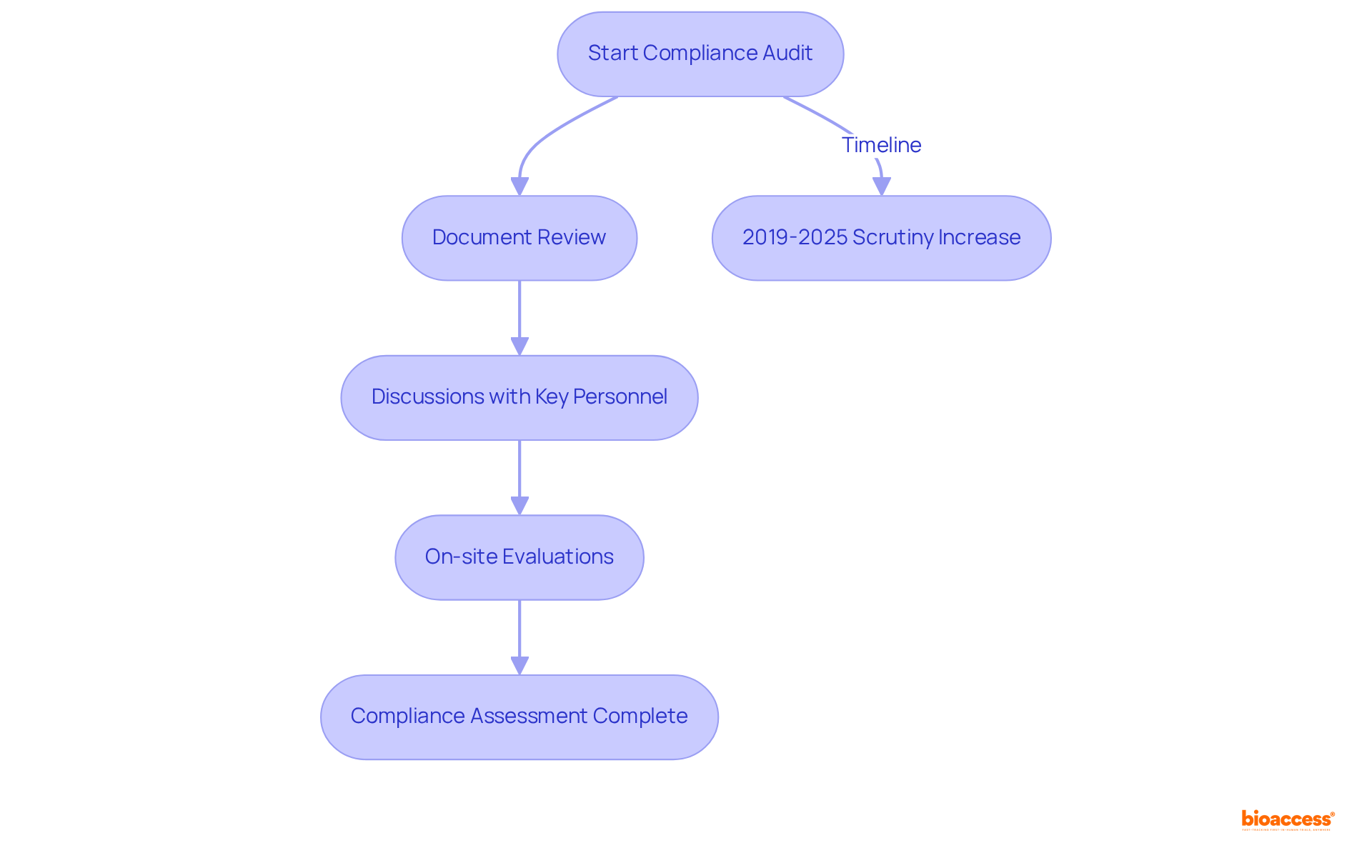
In Mexico, the distributor compliance audit Mexico plays a pivotal role in ensuring compliance with local laws and regulations, highlighting the government's commitment to enhancing transparency and accountability in business operations. Non-compliance with the distributor compliance audit Mexico carries significant consequences, including hefty fines, legal actions, and reputational harm.
Notably, the Mexican Tax Administration Service (SAT) has sharpened its audit focus on large taxpayers to enhance distributor compliance audit Mexico, as they contribute approximately 52% of tax collections. This strategic shift has resulted in an impressive 367% increase in tax revenue from 2019 to 2024, attributed to improved audit strategies targeting these entities.
Such a concentrated approach to distributor compliance audit Mexico not only shields businesses from legal repercussions but also fosters a culture of continuous improvement and operational excellence. By instituting robust compliance protocols, organizations can pinpoint potential risks and bolster their operational integrity, ultimately perceiving regulation as a cost-saving strategy rather than a financial burden.
The SAT's initiatives, including the Tax Master Plan, aim to enhance tax compliance and elevate tax collection by at least 10% within the year, emphasizing the importance of maintaining stringent standards amidst evolving legal frameworks. Organizations prioritizing regulatory compliance are better prepared to navigate the complexities of the Mexican market, ensuring sustainable growth and heightened stakeholder confidence.
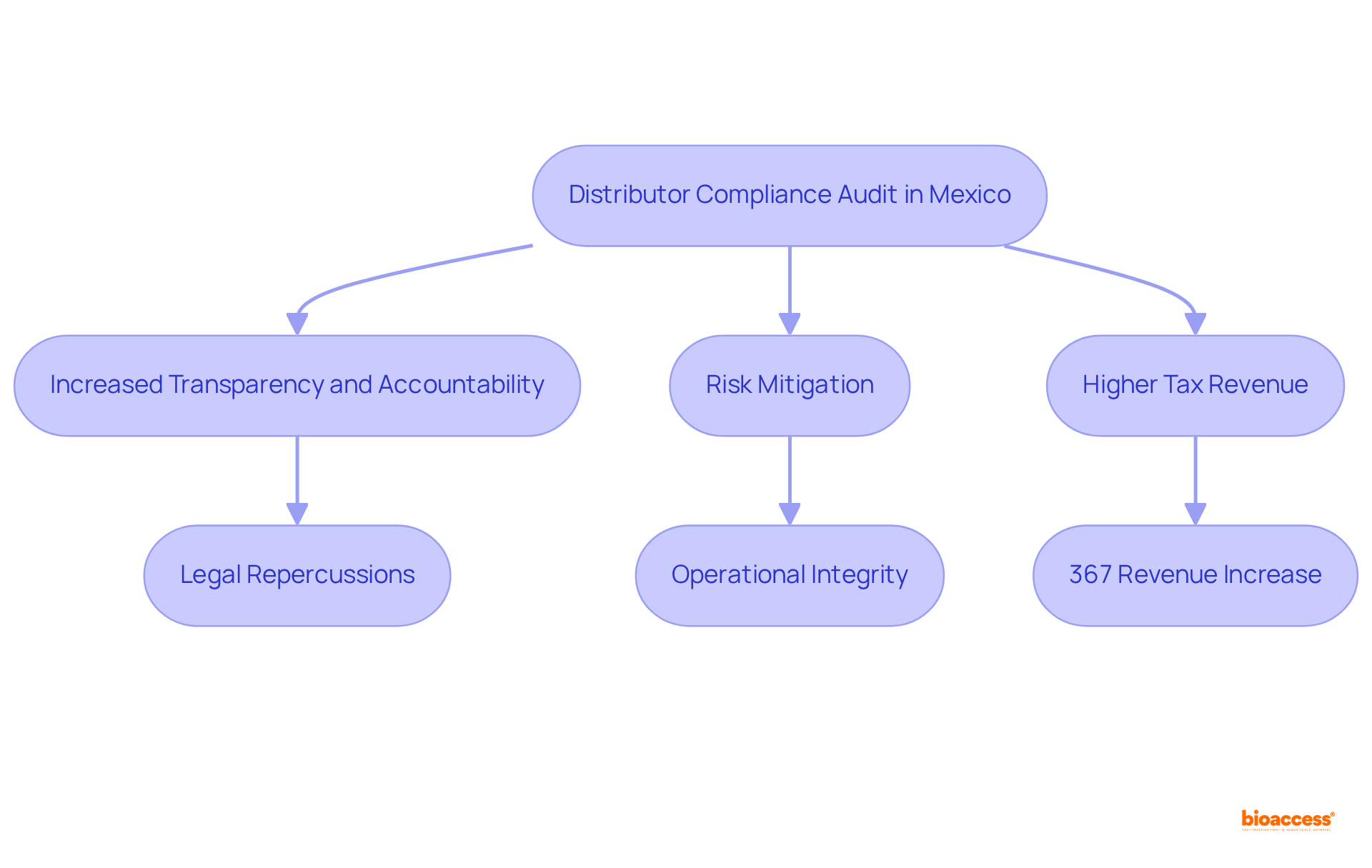
To prepare for a distributor compliance audit in Mexico, it is essential to gather all relevant documentation, including contracts, official filings, and operational procedures. Ensure that you possess up-to-date records demonstrating compliance with local laws for the distributor compliance audit Mexico, including NOM certifications and tax-related documents.
It is crucial to familiarize yourself with the specific regulations applicable to the distributor compliance audit Mexico, as these can differ significantly. Additionally, consider developing a checklist of required documents to streamline your preparation process.
Engaging with legal or regulatory specialists can provide valuable insights into the regulatory landscape, ensuring thorough readiness for the distributor compliance audit in Mexico. Routine evaluations are not only a regulatory obligation; they also enhance operational efficiency and transparency, ultimately safeguarding your organization against potential fines and legal disputes.
Non-compliance with payroll regulations in Mexico can lead to severe consequences, including financial penalties and legal challenges. By prioritizing comprehensive documentation and seeking expert guidance, you can simplify your preparation for the review and reinforce your commitment to regulatory standards.
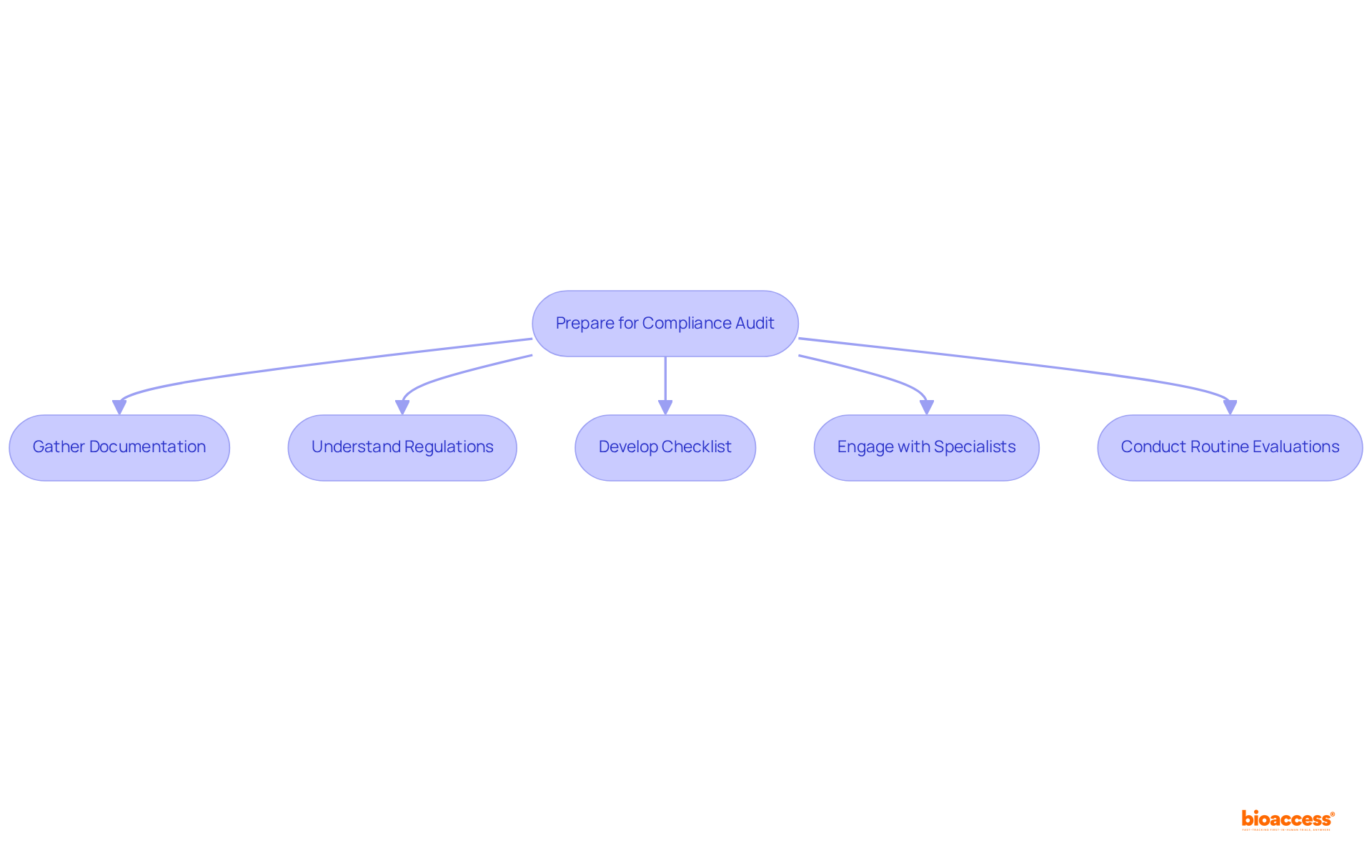
Conducting a distributor compliance audit in Mexico is a critical process that involves several essential steps to ensure a thorough evaluation and adherence to regulatory standards.
Define the Audit Scope: It is imperative to clearly outline the objectives and specific regulatory requirements to focus the audit effectively. Recognizing essential aspects such as quality control, compliance, and operational processes is vital for a successful audit.
Assemble the Audit Team: A qualified team of auditors with expertise in regulatory standards relevant to the Medtech sector must be gathered. In Mexico, the workforce of accountants and auditors is substantial, with over 1.7 million professionals available to support distributor compliance audit Mexico, ensuring access to skilled individuals capable of navigating intricate regulatory environments. The projected job growth of 5.85% for accountants and auditors over the next decade underscores the stability and availability of qualified professionals in this field.
Conduct Document Review: Analyzing all collected documentation is crucial for evaluating adherence levels against established criteria. This step is essential for identifying discrepancies and understanding the distributor's compliance with regulatory requirements.
Conduct On-Site Inspections: Visiting the distributor's facilities allows for the observation of operations, interviewing staff, and confirming adherence to documented procedures. On-site evaluations provide insights that documentation alone may not reveal, thereby enhancing the audit's effectiveness.
Compile Findings: It is necessary to document all observations, noting areas of adherence and non-adherence. This analysis is essential for understanding the overall adherence status and identifying necessary corrective actions.
Engage with Stakeholders: Maintaining open channels of communication with all stakeholders during the evaluation process is vital. Transparency fosters collaboration and ensures that all parties are informed of findings and recommendations.
Integrating routine supplier evaluations is crucial for sustaining quality and regulatory benchmarks, as emphasized by industry specialists. By adhering to these steps, organizations can efficiently handle regulatory reviews, reduce risks, and maintain high standards in the Medtech sector.
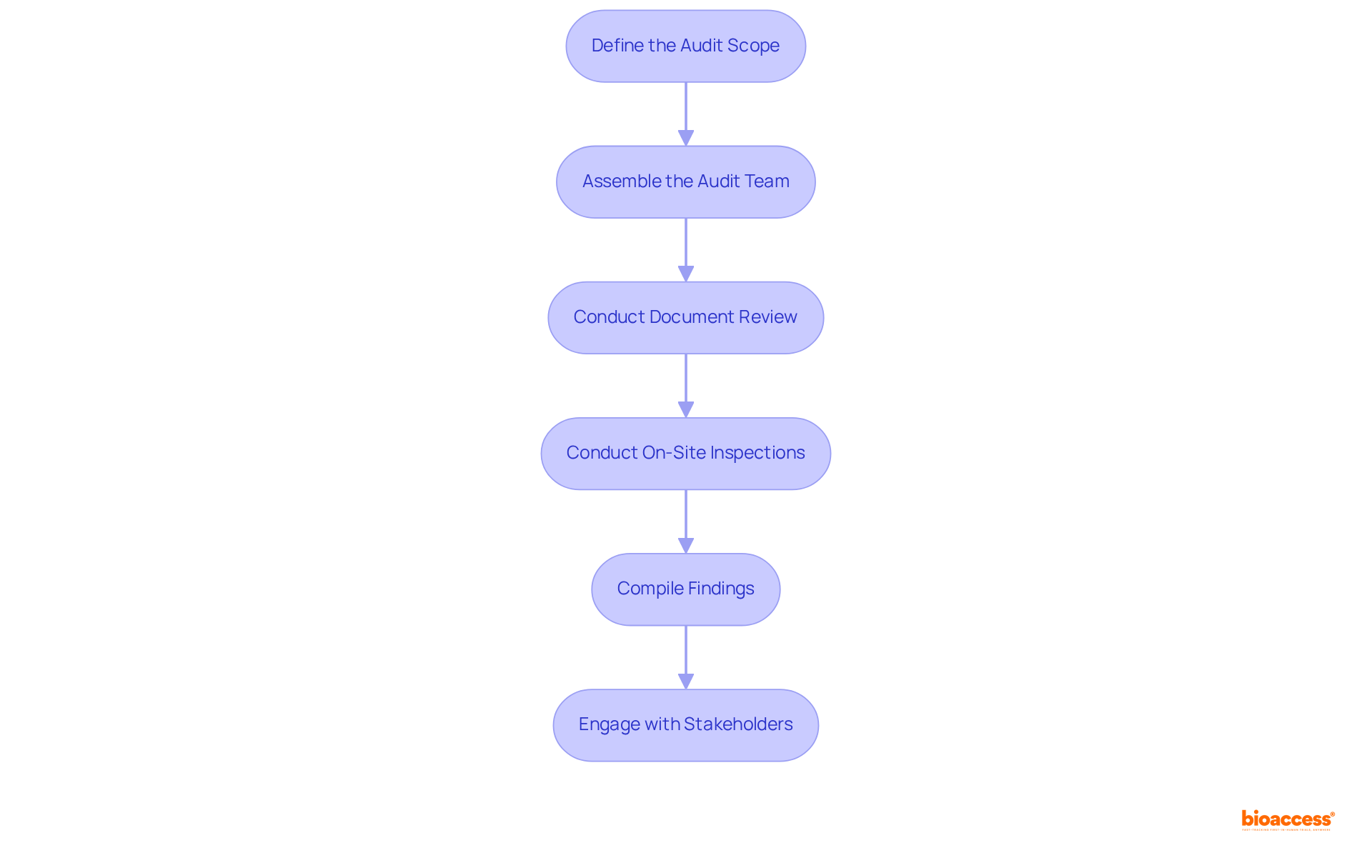
Upon completing the audit, it is crucial to conduct a thorough analysis of the findings. Begin by categorizing the results into areas of adherence and non-adherence. Identify the root causes of any deficiencies and prioritize them based on their potential impact on operations. A comprehensive action plan is essential; this may involve updating existing policies, enhancing training programs, or implementing new regulatory measures. Effectively communicating the findings and proposed changes to all relevant stakeholders is vital for securing their support and buy-in. Establishing a follow-up mechanism will ensure that the implementation of changes is monitored and their effectiveness assessed over time.
In the Medtech industry, the implementation of changes following an audit can lead to significant operational improvements. Organizations that prioritize regulatory adherence strategically often report enhanced reputations, making them more attractive to clients and investors. This is particularly relevant in Mexico, where the SAT has intensified its scrutiny of major taxpayers and multinationals, emphasizing the necessity for a distributor compliance audit Mexico to ensure robust adherence protocols. As Bill Harrison, CEO of ComplianceBridge, notes, viewing regulatory adherence as a cost-saving strategy rather than a mere expense can lead to more efficient operations and reduced downtime. Furthermore, adherence fosters an equitable environment for organizations, ensuring that all parties are held to the same fundamental standards for data protection.
Additionally, the impact of adherence audit findings can catalyze substantial operational changes. Businesses that proactively address regulatory issues not only mitigate risks associated with data breaches but also position themselves advantageously in a competitive market. By continuously educating their teams and remediating systems, these businesses can stay ahead of sophisticated cyber threats, ultimately leading to a more resilient operational framework. Moreover, surpassing compliance standards can bolster a company's reputation with clients and investors, further solidifying its market position.
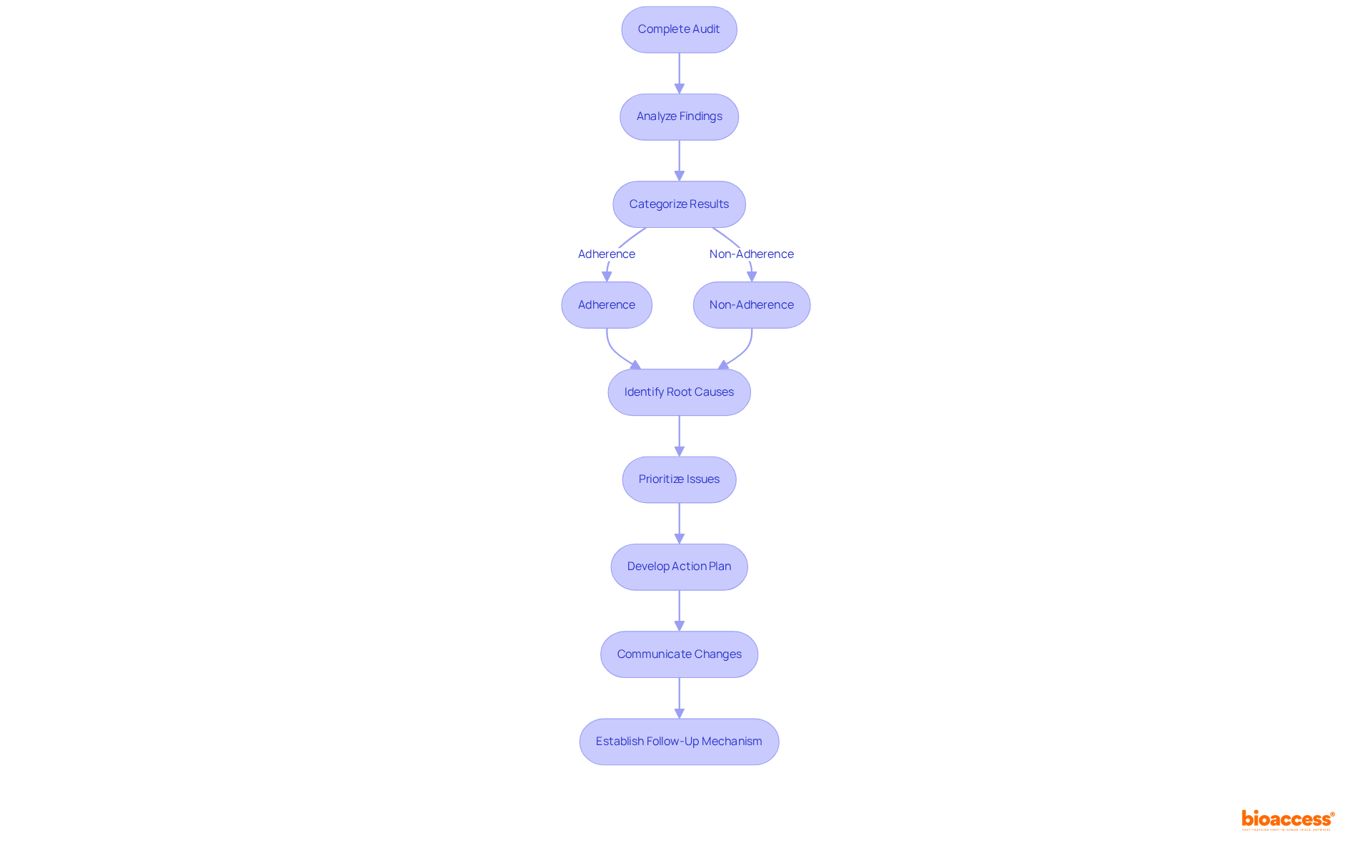
Mastering the distributor compliance audit in Mexico transcends mere regulatory requirement; it emerges as a strategic necessity for businesses aspiring to thrive in an increasingly scrutinized environment. Grasping the complexities of these audits, particularly in a landscape where compliance is paramount, can significantly enhance operational integrity and stakeholder trust.
This article has outlined the essential steps involved in conducting an effective distributor compliance audit, encompassing:
Each phase of this process is pivotal in ensuring adherence to local laws and regulations, ultimately safeguarding organizations from potential penalties while fostering a culture of continuous improvement.
As the regulatory landscape evolves, organizations must adopt compliance as a proactive strategy rather than a reactive obligation. By prioritizing thorough audits and addressing findings with actionable changes, businesses can not only mitigate risks but also position themselves favorably in the competitive market. A commitment to compliance extends beyond merely avoiding fines; it is about constructing a resilient framework that supports sustainable growth and enhances reputation in the eyes of clients and investors alike.
What is a distributor compliance audit?
A distributor compliance audit is a comprehensive evaluation of a distributor's operations, processes, and adherence to legal and contractual obligations, involving document reviews, discussions with personnel, and on-site evaluations.
Why are compliance audits important in Mexico?
Compliance audits in Mexico are crucial for ensuring adherence to local laws and regulations, enhancing transparency and accountability in business operations, and avoiding significant consequences such as fines and legal actions.
What has been the trend in tax revenue in Mexico from 2019 to 2024?
Mexico's tax revenue surged by 367% from 2019 to 2024, indicating increased scrutiny and focus on compliance practices.
How does the Mexican Tax Administration Service (SAT) approach compliance audits?
The SAT has sharpened its audit focus on large taxpayers, who contribute about 52% of tax collections, aiming to enhance compliance and increase tax collection by at least 10% within the year.
What are the potential consequences of non-compliance with distributor compliance audits in Mexico?
Non-compliance can lead to hefty fines, legal actions, and reputational harm for businesses.
How can organizations benefit from prioritizing regulatory reviews?
Organizations that prioritize regulatory reviews can mitigate risks, enhance operational efficiency, and foster a culture of continuous improvement, ultimately perceiving regulation as a cost-saving strategy.
What is the strategic focus of the SAT's Tax Master Plan?
The Tax Master Plan aims to improve tax compliance and elevate tax collection by at least 10% within the year, emphasizing the need for stringent compliance standards amidst evolving legal frameworks.